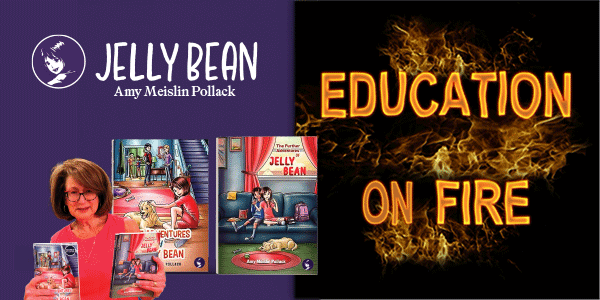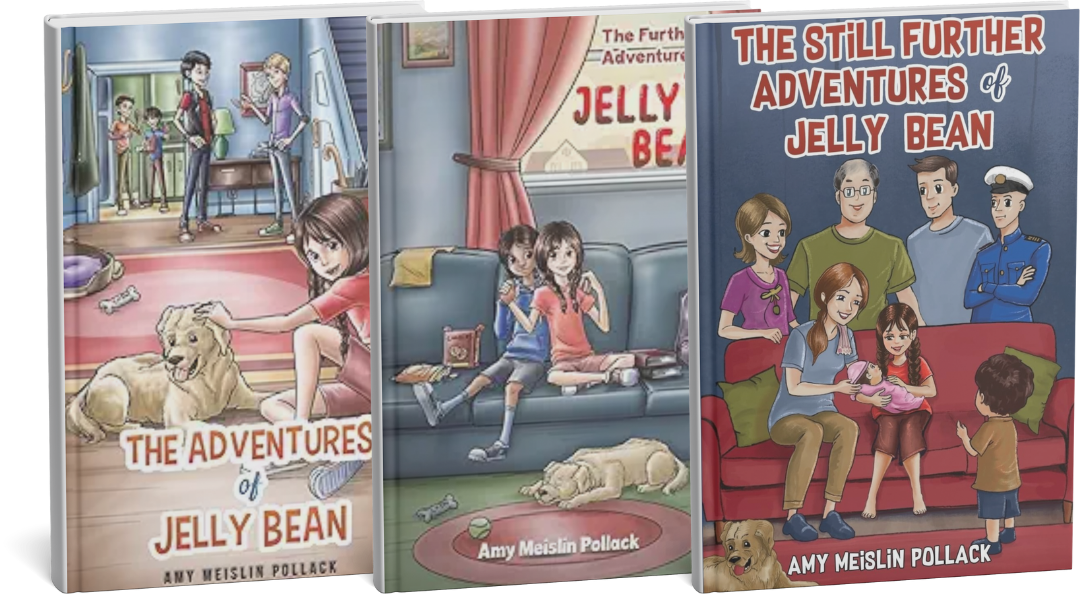

The Adventures of Jelly Bean
Follow Jelly Bean on her exciting adventures as a fourth-grader facing challenges that resonate with children of her age. From navigating friendships and family dynamics to discovering the complexities of life, Jelly Bean’s journey is filled with valuable life lessons.
Written by: Amy Meislin Pollack
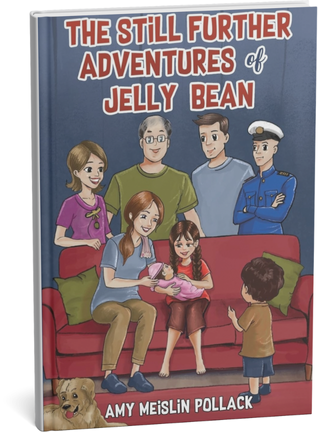
New Release !
The Still Further Adventures of Jelly Bean
Follow Jelly Bean on her exciting adventures as a fourth-grader facing challenges that resonate with children of her age. From navigating friendships and family dynamics to discovering the complexities of life, Jelly Bean’s journey is filled with valuable life lessons.
Written by: Amy Meislin Pollack
Read More

The Author

Amy Meislin Pollack has been a passionate storyteller since her early years. With over 40 years of experience as a teacher, she has shared her love for storytelling with countless students. Amy’s journey as a writer began in fourth grade in 1960 when she created the character Jelly Bean. Since then, she has continued to craft stories about Jelly Bean, sharing them not only with her students but also with her own children and grandchildren. Now, Amy’s stories have been brought to life in two middle-grade books, “The Adventures of Jelly Bean” and “The Further Adventures of Jelly Bean.”
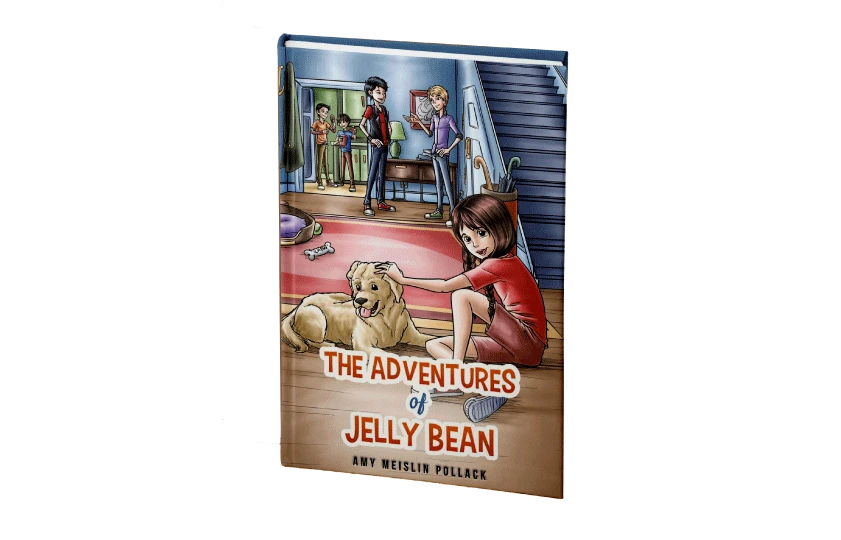
Get it from other locations
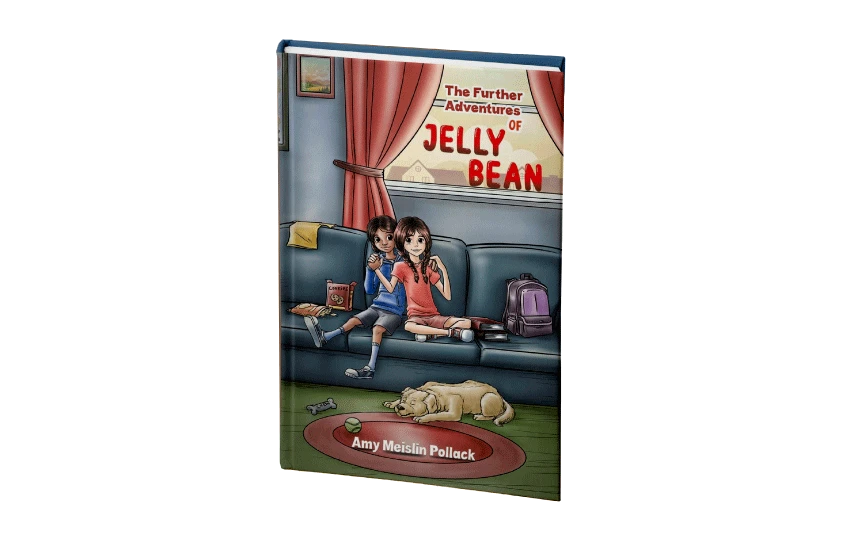
Jelly Bean in the continuation of her adventures as she seeks solutions to the challenges that confronted her in book 1. Michael, her oldest brother, has dropped out of school and joined the Marines, which usurps much of her parents’ attention. Kylie, the new girl in school, faces a medical emergency. And Jelly Bean is still forbidden from going to her best friend’s house. She has to decide how to deal with these dilemmas and more. Along the way she learns about love, death, pain, relationships, the difference between right and wrong and the value of friendship. See the world through the eyes of this forthright fourth-grader as she discovers two truths about life – that it is always complicated, and always changing.
Get it from other locations
This relatively short novel moves at a steady pace, taking Jelly Bean from one dilemma to the next.
An endearing, plucky girl endures and overcomes in this absorbing quick read.
The Bev Moore Show With Guest Amy Pollack
The Bev Moore Show with guest Amy Meislin Pollack, Author of The Adventures of Jelly Bean and The Further Adventures of Jelly Bean
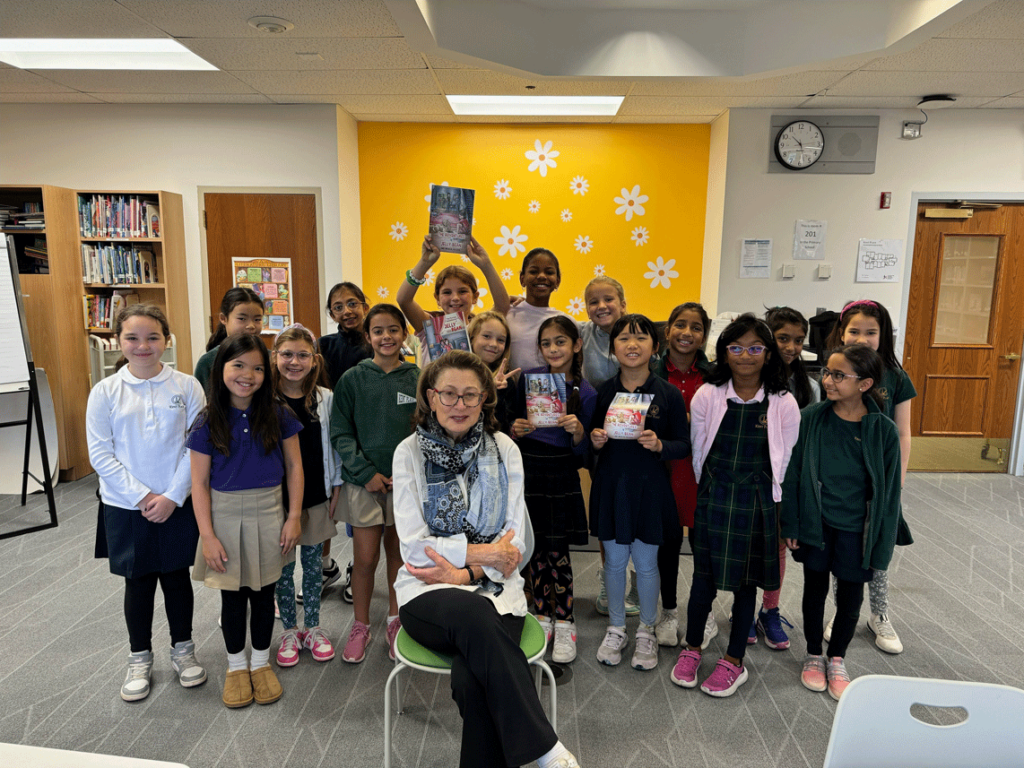
Books And More With Jewish Ladies Podcast
Kway Radio - November 2023
Q&A
Actually, I have been inspired to write for as long as I can remember! I have notebooks and notebooks – both handwritten and typed – of various things I’ve written over the years: poems, plays, stories, essays, and even songs. I did win an essay contest once upon a time, and teachers in all the writing classes I ever took always liked what I’d written. An essay I wrote on teaching in a public high school was also published in my U. of Pa. graduate school alumni journal. What made me bring my Jelly Bean stories to fruition, was my children hounding me to get back to them, and I was finally shamed into doing just that.
My books are about a forthright fourth-grader who confronts issues and challenges many children her age confront as well, and how she learns about friendship, relationships with family members, friends, teachers, and others; popularity, death, love, and what is important in life. Much of what she learns is by trial and error – and her reactions to the results are much of what propels my story along.
My grandchildren are very good sounding boards for my stories, and I product-test by what holds their attention (and I have tried to change what doesn’t work, especially vis-à-vis my grandchild who is the closest in age to my target audience – that is, 8-11-year-olds). Obviously, my two littlest grandchildren don’t enter into the mix, mostly because they’re not old enough to read yet!
What are the challenges children face today? Children do face some tough challenges today. There are: the ups and downs of social media, bullying, widespread drug and alcohol abuse, sexual tensions, rampant eating disorders, popularity and the need to follow certain behaviors, gender identity and confusion, parental pressures, gun violence, suicidal tendencies, and racial inequalities. I could probably name some more, but those look to be the main ones these days confronted by boys and girls today. And those are a lot.
Generational advice is a tough arena, because each child and young adult is different, as are their circumstances. But in general, I would advise seeking help whenever one is up against a seemingly insoluble challenge. It is helpful to speak to someone – anyone – who is a sympathetic listener, not too busy, and (preferably!) someone who is wise. This could be a parent, a grandparent, a sibling, a good friend, a teacher, a priest or rabbi, or someone else who is caring and trustworthy. When all else fails, Jelly Bean finds comfort in her dog. Keeping a diary is also helpful. Frequently in order to find a solution, an issue needs to be either spoken or written about.
Yikes – changes going on with kids’ hormones! I feel like if I had the answers to that I’d write a how-to book and become a billionaire. Seriously though, I feel like boys and girls spiraling into adulthood is no laughing matter. It is just not easy, and that is that. The advice in the above question would be applicable in this matter as well: finding a trusted and caring person (or persons) to speak to is the biggest help I can come up with, as is keeping a journal. Confiding in a pet might not do it for this one.
It does feel like life was simpler when I was growing up: we played out on our street for fun (kickball, spud, tag, jump rope, etc). I could get misty-eyed thinking about those days. But other issues and challenges were just not talked about, and/or swept under the rug. No one, for example, discussed cancer, abortions, even divorced was a no-no. Certainly not eating disorders or drug problems. And so, I suppose the way things were in the 50’s and 60’s (I was born in 1953) was better but also worse, because if these issues weren’t addressed, solutions were more difficult to come by. Things were just beginning to change when I was a teenager (that is, in the late 60’s).
Are there any authors you seek o model? I did at one time try to emulate the “Betsy Tacy” books, and some people have said my books bear a resemblance to Judy Blume’s. I don’t think I actually ever consciously set out to model my books after any other writers’, but I have also read very widely (and eclectically) from (all of) Dickens, to Tolstoy, Flaubert, Stendahl, Robert Louis Stevenson, Heidi and Bambi, the Pooh books, the Oz books, and also I’ve read many more recent authors that I’ve enjoyed very much as well. So, I’m sure both old and more recent influences have found their way into my writing.
I think my writing style is just authentically mine. I try to channel Jelly Bean, but I can hear the voices and the dilemmas of the other major characters in my stories – most notably Britney and also Jelly Bean’s mom, dad, and her older brothers. My characters tell me what they need to say and do (I am no good at outlining), and so perhaps I’d have to call that some form of stream of consciousness. I always would read to my children at night before bed (until they wouldn’t allow me to anymore!), and so now that I think about it, The Anne of Green Gables series, which I read to my daughter and loved, was probably a writing style I subconsciously emulated. I also try to inject a good dose of humor in my stories, since I like that in books I read, wherever it can be found.
Yes, there is definitely a message of some sort about life and death because we live in this post 9/11 world, which is when my book takes place. It is evident in Jelly Bean’s oldest brother deciding to join the Marines. I believe it changed everyone and everything. When I was teaching 6th-graders, right after 9/11 I scrapped a lot of the curriculum in favor of teaching a lot about other parts of the world and their issues which are so different from ours in this country. I have also had many more experiences with life, death and dying, because of my age. So, these harsher aspects of life do enter into my writing, but I try to handle them all from a young person’s point of view.
And yes, I do hope that my books will open discussions for our young people about choices they make, learning to think for themselves, and about having respect for themselves and for others. Choices are difficult to make, and we are confronted with them all the time. Learning to make good choices is such an important skill, and can determine so much of the rest of one’s life. Many examples of Jelly Bean learning to make wise choices are a very big part of my books, and I know they can lead to many valuable discussions (with parents, teachers, friends, siblings, and grandparents).
As the saying goes: “the more things change, the more they stay the same.” Young people have the same feelings they always did and the same proclivities, let’s say, but sadly guns and drugs are more available to them. The times have definitely changed. Many families are also different than they were, so that many of my students had little or no support at home. For one example, until I taught at the high school where I ended up teaching, I had never known (much less heard) of an “emancipated minor” (i.e., a fifteen- year-old who lived on his own, and whose parents had both abandoned him). That would have been unheard of when I was growing up. I also had some (high school) students who were intelligent, but who were non-readers. And I could go on. I’m not sure how to ameliorate this situation. Of course it all takes money…..but I digress.
That is such an interesting question. And yes, some ways I raised my children were very similar to the ways in which I was raised. I was so fortunate to have been raised by two caring parents who loved, nurtured and encouraged me in much of what I wanted to pursue. For example, I think my dad loved taking me around to look at colleges much more than I enjoyed it! But there were differences: while I could tell my parents certain things, there were unspoken parameters I NEVER would have breached! I’m happy to say that my children could talk to me about most things, and I tried my best to be a good listener. I was, however, strict when I needed to be, much to their chagrin – which was how my parents were with me. And I could go on, but there’s no more room here.
Jelly Bean is a little bit of me, but even more she is an amalgam of my husband’s cousin Carol, who had three older brothers, and who inspired me greatly in writing these books; and my daughter Becky, who has two older brothers. Since I was the oldest of three children, their family constellations intrigued me and I was able to observe firsthand and understand some of the challenges they were up against, both in terms of their older siblings not always including them and also of their moms (one of whom would be me!) not always having the energy to deal with them. My granddaughter Hannah also provided me with many examples of current situations and ideas, re: bringing my story up to date (e.g., enlightening me that girls play – flag – football “nowadays” …….which is why Jelly Bean does!).
Re combatting learning deficits and mental health challenges, I do think – as I mentioned above – having a caring and trustworthy adult to confide in is key. Secondly, probably more in the way of guidance should be offered in schools. After reading The Short and Tragic Life of Robert Peace, I thought about this issue a lot. For those who haven’t read the book, Robert, the main character, is given a full scholarship to Yale. He is not, however, given a mentor or any guidance person, and his background is such that he is not equipped to deal with the pressures of being at an ivy league college. And so, his life became short and tragic. Had he had someone who was available to him to express himself and guide him to make good decisions, things could very well have been different, and he could have gone on to have a more productive and successful life. This is just one way I think the deficits described above could be improved and the challenges helped.
© 2025 Amy Meislin Pollack. All rights reserved.
Designed by Hanady Brand Development

